The Fair City Challenge
The Economy League seeks community-driven solutions to make our neighborhoods more equitable and inclusive and to help close Philadelphia’s racial wealth gap. We’ll invest $50,000 in the best idea.
About the Fair City Challenge...
In the US, homeownership has historically been a primary way that families have built generational wealth. Philadelphia has long been a city of homeowners, with 52% of Philadelphians owning their homes, including 48% of Black Philadelphians and 42% of Latino Philadelphians. Philadelphia is also unique in its large number of low- and moderate-income homeowners.
Yet research by the Economy League and others shows that properties in non-white-majority neighborhoods are dramatically undervalued, denying many Philadelphians billions of dollars in home equity and the opportunity to build generational wealth through homeownership. This is not only bad news for Philadelphia’s families but for the overall tax base and economy.
The Fair City Challenge aims to identify and support community-based social entrepreneurs with great ideas for revaluing property in historically disinvested Philadelphia neighborhoods - while preventing displacement.
All Challenge finalists will win $10,000 and entry into an accelerator to develop a business plan to advance their idea. The Grand Prize winner will earn a $50,000 investment.
To apply, first determine which of the following categories most closely describes the type of project your team will propose:
The Home & the Homeowner: A well-maintained home with modern systems is generally worth more than one that has languished. How can low- and moderate-income homeowners afford to maintain and upgrade their homes? How do people deal with rising costs on a fixed income? How do homeowners adapt to changing circumstances and needs? How can homeowners be supported to have a happy home rather than a headache?
The Neighborhood: The value of a home is directly tied to the perceived ‘desirability’ of the neighborhood in which it sits. How can communities be supported to make their neighborhoods cleaner, greener, safer, and better able to meet residents’ needs and wants without fear of displacement? How can current residents shape development decisions that impact their communities?
The City: The value of our homes is also tied to the perception of the City as well as its policies and practices around land use, development, taxes, and so forth. How might communities organize to propose policies aimed at building household and community wealth while keeping incumbent homeowners in their homes in the face of gentrification? What advocacy is needed?
If you have any questions, please contact Meg Niman at [email protected].
THE APPLICATION PROCESS IS NOW CLOSED

"The Challenge" Model
Our innovation challenges are the hallmark of Impact Labs. Through our extensive network of partners, we identify promising 'everyday innovators' and put them through a tech-style, 'fail fast' incubator and accelerator program designed to stress test a social enterprise and prepare it to scale. Our goal is maximum impact for equity.
Gather input from local communities and key stakeholders to formalize selection of community focus areas
Recruit program partners and advisors to assist with testing and implementation of the Fair City Challenge
Activate everyday innovators advancing solutions that leverage community and social connection to address housing equity challenges
Help participating social entrepreneurs test their assumptions and develop compelling pitches
Pitch competition prizes awarded to fund community winners for venture testing in the next phase
Connect selected ventures with regional leaders and established orgs to create opportunities for learning and testing
Connect Fair City grand prize winner with with resources to support continued professional growth and the implementation of their proposed solution.

Background
Know Your Price, Philly, a new report from the Economy League of Greater Philadelphia in partnership with Dr. Kevin Gillen of Drexel University’s Lindy Institute and inspired by Dr. Andre Perry of the Brookings Institution, analyzes 70 years of property value data by race/ethnicity and neighborhood to quantify devaluation in Philadelphia. This report will serve as the basis for The Fair City Challenge, an Economy League Impact Labs competition that will identify, incubate, and accelerate community-driven solutions to this critical element of the racial wealth gap in our city and in the nation as a whole.
Key Takeaways:
- Had houses in majority Black neighborhoods appreciated at the same rate as houses in white neighborhoods (after inflation) since 1950, homeowners in Black neighborhoods would collectively have $24bn more in housing wealth. Similarly, homeowners in Latino neighborhoods would collectively have $33.4bn more in housing wealth.
- Individually, Black homeowners who bought in 1950 would have nearly $113,000 more in housing wealth, while Latino homeowners would have just over $157,000 more in housing wealth.
Sponsor The Fair City Challenge
The devaluation of properties within neighborhoods of color is the longest tail of structural racism, a massive barrier to accessing the benefits of long-term property ownership, building generational wealth, and sustaining adequately resourced and economically resilient communities. Driven by an Economy League study called Know Your Price Philly - which analyzed 70 years of property value data to identify a massive, racialized equity gap in Philadelphia's housing market - we will be launching the Fair City Challenge in 2024. We will be seeking everyday innovators with promising solutions for revaluing property in historically marginalized neighborhoods.






